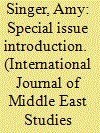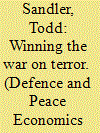| Srl | Item |
| 1 |
ID:
131559


|
|
|
|
|
| Publication |
2014.
|
| Summary/Abstract |
Almost two decades ago, Michael Bonner, Mine Ener, and I organized the first in a series of MESA panels on the general theme of poverty and charity in Middle Eastern contexts. We came to the topic using different chronologies, sources, and approaches but identified a common field of interest in shared questions about how attitudes toward benevolence and poverty affected state and society formation: in early Islamic thought, in the Ottoman Empire of the 15th and 16th centuries, and in khedival Egypt. At that time, we could confidently state that there was very little work in the broad field of Middle East and Islamic studies that focused explicitly on the study of charity and poverty.
|
|
|
|
|
|
|
|
|
|
|
|
|
|
|
|
| 2 |
ID:
119264


|
|
|
|
|
| Publication |
2013.
|
| Summary/Abstract |
This article introduces a supply-side perspective to the study of counterterrorism, where terrorists are viewed as combining terrorist attacks to achieve an aggregate output (e.g. social anxiety). With this novel approach, the elasticity of substitution, associated with the terrorists' production function, becomes a key determinant of the effectiveness of deterrence. If this elasticity is large, then countermeasures have very limited effectiveness when directed at a single mode of attack. If, in contrast, attack modes are complements, focused countermeasures can completely eliminate terrorists' gains. Counterterrorism measures are more effective when terrorist campaigns display little diversity of attacks. The article also identifies when proactive policies are more effective than defensive policies. The supply-side perspective gives a new pessimistic view to benevolence, which reduces the cost of nonterrorist activities.
|
|
|
|
|
|
|
|
|
|
|
|
|
|
|
|